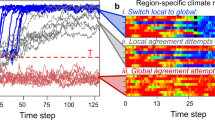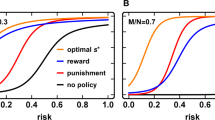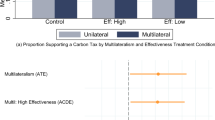Abstract
Avoiding the effects of climate change may be framed as a public goods dilemma1, in which the risk of future losses is non-negligible2,3,4,5,6,7, while realizing that the public good may be far in the future3,7,8,9. The limited success of existing attempts to reach global cooperation has been also associated with a lack of sanctioning institutions and mechanisms to deal with those who do not contribute to the welfare of the planet or fail to abide by agreements1,3,10,11,12,13. Here we investigate the emergence and impact of different types of sanctioning to deter non-cooperative behaviour in climate agreements. We show that a bottom-up approach, in which parties create local institutions that punish free-riders, promotes the emergence of widespread cooperation, mostly when risk perception is low, as it is at present3,7. On the contrary, global institutions provide, at best, marginal improvements regarding overall cooperation. Our results clearly suggest that a polycentric approach involving multiple institutions is more effective than that associated with a single, global one, indicating that such a bottom-up, self-organization approach, set up at a local scale, provides a better ground on which to attempt a solution for such a complex and global dilemma.
This is a preview of subscription content, access via your institution
Access options
Subscribe to this journal
Receive 12 print issues and online access
$209.00 per year
only $17.42 per issue
Buy this article
- Purchase on Springer Link
- Instant access to full article PDF
Prices may be subject to local taxes which are calculated during checkout



Similar content being viewed by others
References
Barrett, S. Environment and Statecraft: The Strategy of Environmental Treaty-Making (Oxford Univ. Press, 2005).
Milinski, M., Semmann, D., Krambeck, H. J. & Marotzke, J. Stabilizing the Earth’s climate is not a losing game: Supporting evidence from public goods experiments. Proc. Natl Acad. Sci. USA 103, 39 94–3998 (2006).
Barrett, S. Why Cooperate? The Incentive to Supply Global Public Goods (Oxford Univ. Press, 2007).
Milinski, M., Sommerfeld, R. D., Krambeck, H. J., Reed, F. A. & Marotzke, J. The collective-risk social dilemma and the prevention of simulated dangerous climate change. Proc. Natl Acad. Sci. USA 105, 2291–2294 (2008).
Tavoni, A., Dannenberg, A., Kallis, G. & Löschel, A. Inequality, communication and the avoidance of disastrous climate change in a public goods game. Proc. Natl Acad. Sci. USA 108, 11825–11829 (2011).
Santos, F. C. & Pacheco, J. M. Risk of collective failure provides an escape from the tragedy of the commons. Proc. Natl Acad. Sci. USA 108, 10421–10425 (2011).
Heal, G. & Kristrom, B. Uncertainty and climate change. Environ. Resour. Econom. 22, 3–39 (2002).
Levin, S. A. Learning to live in a global commons: Socioeconomic challenges for a sustainable environment. Ecol. Res. 21, 328–333 (2006).
Levin, S. A. The trouble of discounting tomorrow. Solutions 4, 20–24 (2012).
Ostrom, E. Policy Research Working Paper, Background Paper to the 2010 World Development Report, WPS5095, The World Bank (2009).
Walker, B. et al. Looming global-scale failures and missing institutions. Science 325, 1345–1346 (2009).
Poteete, A. R., Janssen, M. A. & Ostrom, E. Working Together: Collective Action, the Commons, and Multiple Methods in Practice (Princeton Univ. Press, 2010).
Young, O. R., King, L. A. & Schroeder, H. (eds) in Institutions and Environmental Change (MIT Press, 2008).
Pacheco, J. M., Santos, F. C., Souza, M. O. & Skyrms, B. Evolutionary dynamics of collective action in n-person stag hunt dilemmas. Proc. R. Soc. B 276, 315–321 (2009).
May, R. M., Levin, S. A. & Sugihara, G. Ecology for bankers. Nature 451, 893–895 (2008).
Rendell, L. et al. Why copy others? Insights from the social learning strategies tournament. Science 328, 208–213 (2010).
Sigmund, K., De Silva, H., Traulsen, A. & Hauert, C. Social learning promotes institutions for governing the commons. Nature 466, 861–863 (2010).
Fowler, J. H. & Christakis, N. A. Cooperative behavior cascades in human social networks. Proc. Natl Acad. Sci. USA 107, 5334–5338 (2010).
Carman, K. G. Discussion Paper 02–13 (Stanford Institute for Economic Policy Research, 2003).
Sigmund, K. The Calculus of Selfishness (Princeton Univ. Press, 2010).
Traulsen, A., Nowak, M. A. & Pacheco, J. M. Stochastic dynamics of invasion and fixation. Phys. Rev. E 74, 011909 (2006).
Milinski, M., Röhl, T. & Marotzke, J. Cooperative interaction of rich and poor can be catalyzed by intermediate climate targets. Climatic Change 1–8 (2011).
Chakra, M. A. & Traulsen, A. Evolutionary dynamics of strategic behavior in a collective-risk dilemma. PLoS Comput. Biol. 8, e1002652 (2012).
Van Segbroeck, S., Pacheco, J. M., Lenaerts, T. & Santos, F. C. Emergence of fairness in repeated group interactions. Phys. Rev. Lett. 108, 158104 (2012).
Barrett, S. & Dannenberg, A. Climate negotiations under scientific uncertainty. Proc. Natl Acad. Sci. USA 109, 17372–17376 (2012).
Traulsen, A., Hauert, C., De Silva, H., Nowak, M. A. & Sigmund, K. Exploration dynamics in evolutionary games. Proc. Natl Acad. Sci. USA 106, 709–712 (2009).
Schroeder, H., Boykoff, M. T. & Spiers, L. Equity and state representations in climate negotiations. Nature Clim. Change 2, 834–836 (2012).
Traulsen, A., Röhl, T. & Milinski, M. An economic experiment reveals that humans prefer pool punishment to maintain the commons. Proc. R. Soc. B 279, 3716–3721 (2012).
Western Climate Initiative (http://www.westernclimateinitiative.org/).
Maynard-Smith, J. & Szathmáry, E. The Major Transitions in Evolution (Freeman, 1995).
Acknowledgements
The authors thank F. L. Pinheiro for useful discussions. This research was supported by FCT-Portugal through grants SFRH/BD/86465/2012, PTDC/FIS/101248/2008 and PTDC/MAT/122897/2010, by multi-annual funding of CMAF-UL and INESC-ID (under the project PEst-OE/EEI/LA0021/2013) provided by FCT-Portugal, and Fundação Calouste Gulbenkian through the Stimulus to Research programme for young researchers.
Author information
Authors and Affiliations
Contributions
V.V.V., F.C.S. and J.M.P. have contributed equally to this work: they all designed and performed the research, analysed the data and wrote the paper.
Corresponding author
Ethics declarations
Competing interests
The authors declare no competing financial interests.
Supplementary information
Rights and permissions
About this article
Cite this article
Vasconcelos, V., Santos, F. & Pacheco, J. A bottom-up institutional approach to cooperative governance of risky commons. Nature Clim Change 3, 797–801 (2013). https://doi.org/10.1038/nclimate1927
Received:
Accepted:
Published:
Issue Date:
DOI: https://doi.org/10.1038/nclimate1927
This article is cited by
-
Delegation to artificial agents fosters prosocial behaviors in the collective risk dilemma
Scientific Reports (2022)
-
Punishment institutions selected and sustained through voting and learning
Nature Sustainability (2022)
-
A collective risk dilemma for tourism restrictions under the COVID-19 context
Scientific Reports (2021)
-
A well-timed shift from local to global agreements accelerates climate change mitigation
Nature Communications (2021)
-
The role of peer reward and punishment for public goods problems in a localized society
Scientific Reports (2020)



